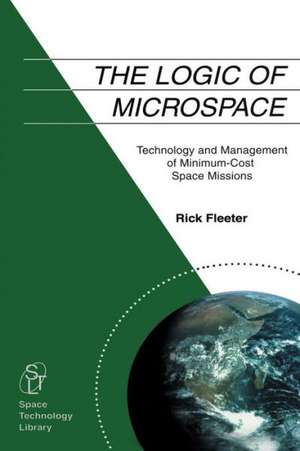The Logic of Microspace: Space Technology Library, cartea 9
Autor R. Fleeteren Limba Engleză Paperback – 15 oct 2012
Din seria Space Technology Library
- 20%
 Preț: 569.38 lei
Preț: 569.38 lei - 17%
 Preț: 363.75 lei
Preț: 363.75 lei - 20%
 Preț: 476.05 lei
Preț: 476.05 lei - 18%
 Preț: 947.98 lei
Preț: 947.98 lei - 15%
 Preț: 643.99 lei
Preț: 643.99 lei - 18%
 Preț: 1688.57 lei
Preț: 1688.57 lei - 18%
 Preț: 957.75 lei
Preț: 957.75 lei - 18%
 Preț: 1393.27 lei
Preț: 1393.27 lei -
 Preț: 393.35 lei
Preț: 393.35 lei - 18%
 Preț: 956.03 lei
Preț: 956.03 lei - 15%
 Preț: 647.08 lei
Preț: 647.08 lei -
 Preț: 429.70 lei
Preț: 429.70 lei - 24%
 Preț: 1057.71 lei
Preț: 1057.71 lei - 18%
 Preț: 1215.04 lei
Preț: 1215.04 lei - 24%
 Preț: 810.46 lei
Preț: 810.46 lei - 18%
 Preț: 1009.08 lei
Preț: 1009.08 lei - 18%
 Preț: 955.40 lei
Preț: 955.40 lei - 18%
 Preț: 947.50 lei
Preț: 947.50 lei - 15%
 Preț: 584.92 lei
Preț: 584.92 lei - 15%
 Preț: 647.40 lei
Preț: 647.40 lei - 18%
 Preț: 1834.77 lei
Preț: 1834.77 lei - 15%
 Preț: 590.16 lei
Preț: 590.16 lei - 15%
 Preț: 600.30 lei
Preț: 600.30 lei - 15%
 Preț: 713.33 lei
Preț: 713.33 lei - 23%
 Preț: 739.86 lei
Preț: 739.86 lei - 18%
 Preț: 998.66 lei
Preț: 998.66 lei - 23%
 Preț: 748.99 lei
Preț: 748.99 lei
Preț: 479.55 lei
Preț vechi: 564.18 lei
-15% Nou
Puncte Express: 719
Preț estimativ în valută:
91.77€ • 95.46$ • 75.76£
91.77€ • 95.46$ • 75.76£
Carte tipărită la comandă
Livrare economică 14-28 aprilie
Preluare comenzi: 021 569.72.76
Specificații
ISBN-13: 9789401058520
ISBN-10: 9401058520
Pagini: 472
Ilustrații: XXI, 447 p.
Dimensiuni: 160 x 240 x 30 mm
Greutate: 0.65 kg
Ediția:Softcover reprint of the original 1st ed. 2000
Editura: SPRINGER NETHERLANDS
Colecția Springer
Seria Space Technology Library
Locul publicării:Dordrecht, Netherlands
ISBN-10: 9401058520
Pagini: 472
Ilustrații: XXI, 447 p.
Dimensiuni: 160 x 240 x 30 mm
Greutate: 0.65 kg
Ediția:Softcover reprint of the original 1st ed. 2000
Editura: SPRINGER NETHERLANDS
Colecția Springer
Seria Space Technology Library
Locul publicării:Dordrecht, Netherlands
Public țintă
ResearchCuprins
1: Microspacecraft.- 1. Why Are We Here?.- 2. Propulsion — Or, How to Get There?.- 3. Orbit Mechanics — Or, What Keeps These Things Up, Anyway?.- 4. Orbit Mechanics II: The Movie.- 5. You Send Me: Orbit Mechanics III 47.- 6. Magnetic Attractions.- 7. Everything You Always Wanted to Know About Radio, Part I: Shatter the Myth of the Digital Miracle?.- 8. Everything You Always Wanted to Know About Radio, Part II: Faster than a Speeding Bullet.- 9. Everything You Always Wanted to Know About Radio, Part III: What’s Up, Doc?.- 10. Thermal Dynamics: Tough Talk About Temperature. A short, virtually painless, and occasionally philosophical look at spacecraft thermostatics and thermodynamics.- 11. You got an Attitude, Buddy? A Primer on Small Satellite Stability and Control.- 12. Memory Systems of Spacecraft—or— Memory — What Is It Good For?.- 13. Mechanisms: The Nuts and Bolts of Small Satellites.- 14. Batteries Not Included.- 15. Bring’Em Up Clean.- 16. Choosing A Launch Site.- 17. Satellite Constellations.- II: Missions and Management Reliability Section 1: Missions.- 1. The Smallest Show on Earth or, Tom Thumb in the Big Top.- 2. Telepresence: Paul Bunyan Takes a Hike.- 3. Being Disruptive — or — Lessons from the Ever-Expanding Backpack.- 4. More of Less is More: The Logic of Microspace.- 5. The One-Bit Sound Bite.- 6. Nothing Is Cost-Optimized.- 7. What Came First, Chickens or Eggs—Really? Some Recipes.- II: Missions and Reliability Section 2: Reliability.- 1. The Mantra of Reliability.- 2. Fun with Parts.- 3. The Logic of Auto Parts.- 4. Darwin Predated Satellites but Engineering Obsoletes Evolution.- 5. Baby Boomer Risk Reduction: Revisiting the Clean Room.- 6. Engineering Religion.- 7. Where to Look for Historical Underpinnings, Term Definitions, andRevolutionary Zeal.- II: Missions and Reliability Section 3: Critical Design Review.- 1. Critical Design Review: A Meditation.- 2. The Dilbert Wars: The Front Lines of Program Management.- 3. Killing the Wooly Mammoth.- 4. What Mood Is Your Program in?.- 5. Developing a Program Plan.- 6. The Future: A Lot of Unknowables, a Few Inevitables.- 7. Space History and a Possible Future.- III: A Wrinkle in Microspace.
Notă biografică
Rick Fleeter is founder and President of the small spacecraft company, AeroAstro. He has built more than 20 successful small satellites.














